Unit 5 Topic 3 My school life is very interesting. Section D (共23张PPT)
文档属性
| 名称 | Unit 5 Topic 3 My school life is very interesting. Section D (共23张PPT) | 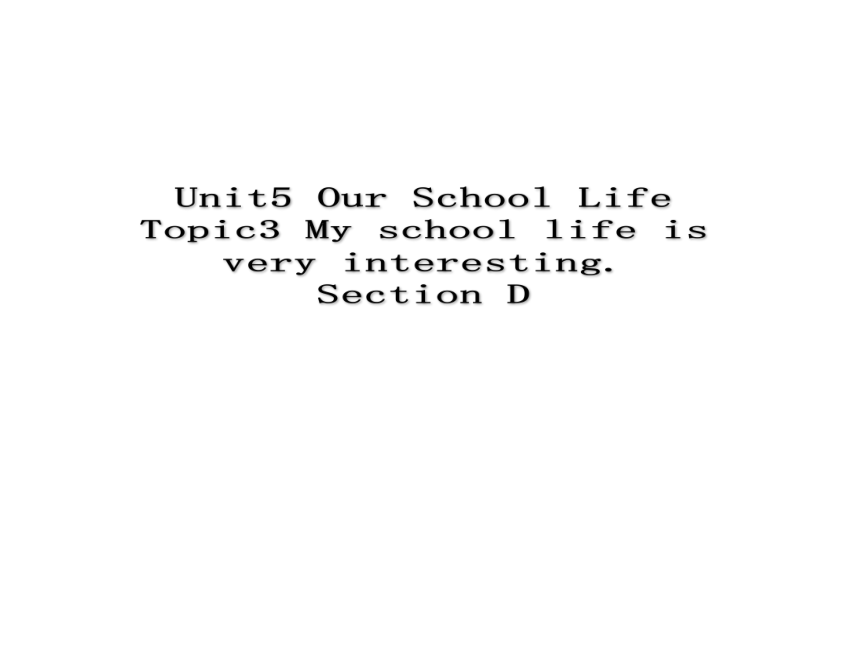 | |
| 格式 | pptx | ||
| 文件大小 | 436.2KB | ||
| 资源类型 | 教案 | ||
| 版本资源 | 仁爱科普版 | ||
| 科目 | 英语 | ||
| 更新时间 | 2023-12-08 15:58:29 | ||
图片预览

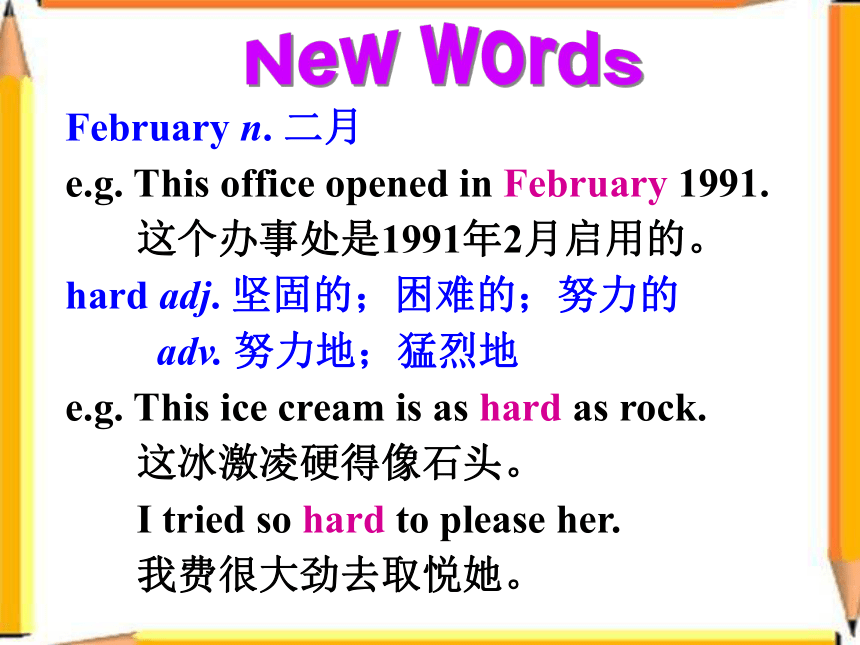
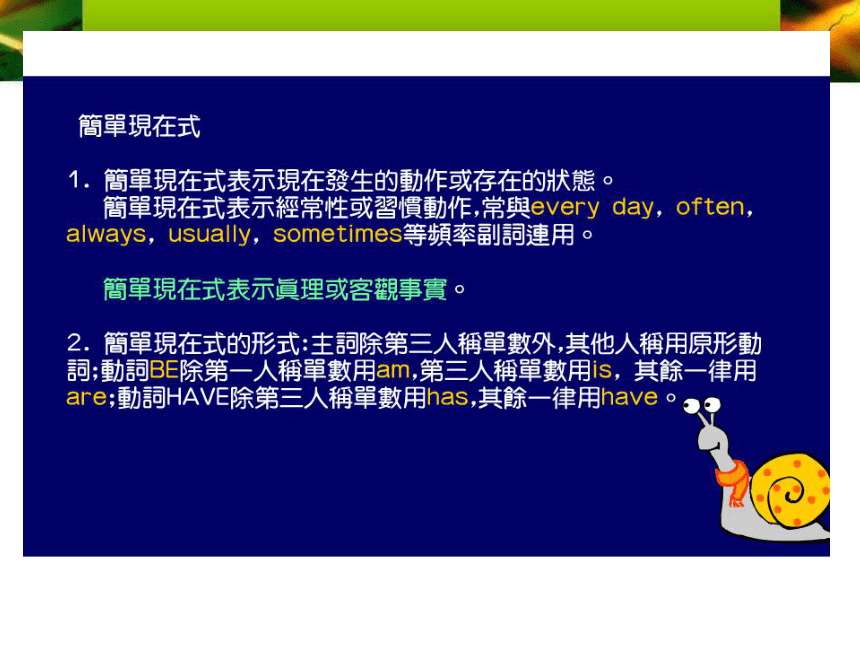
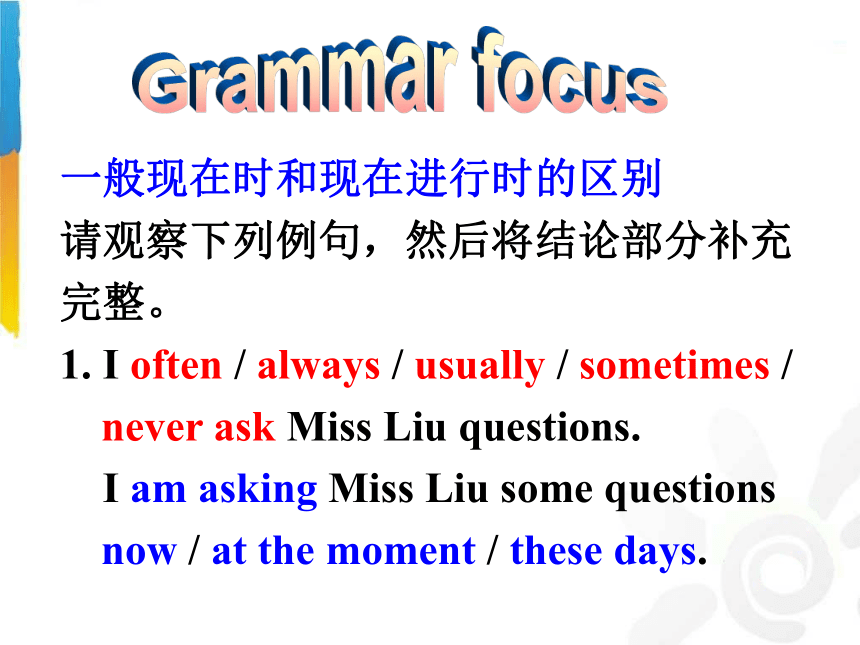
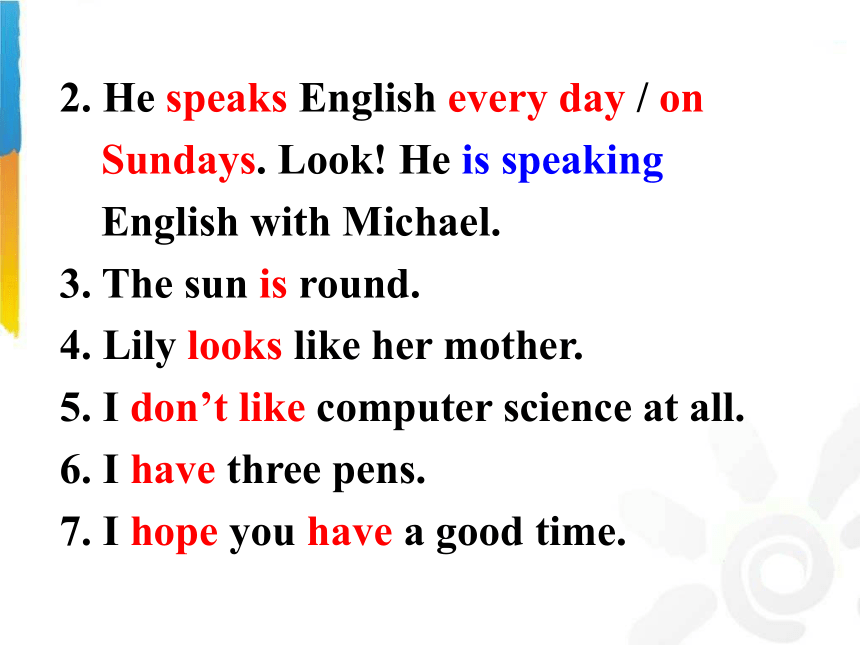
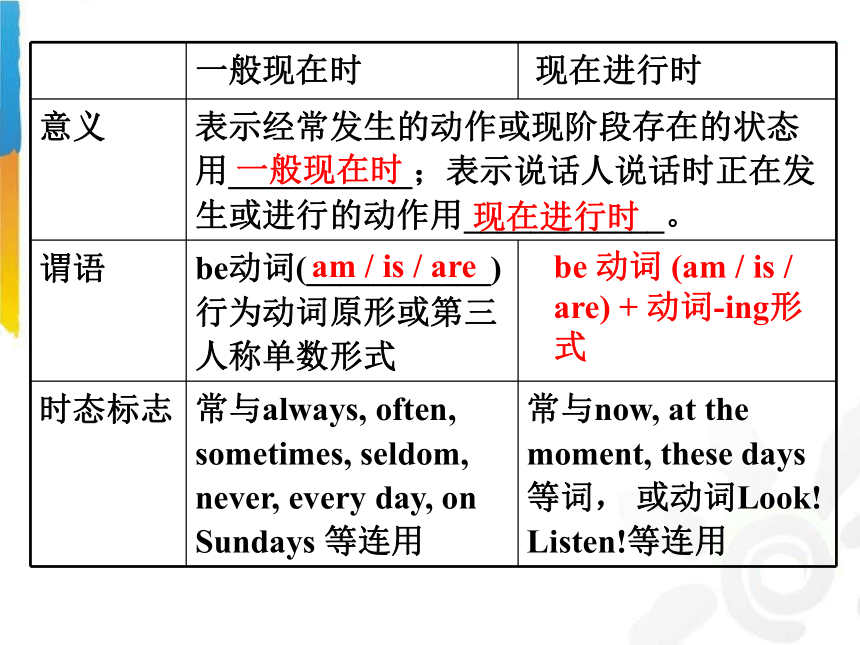
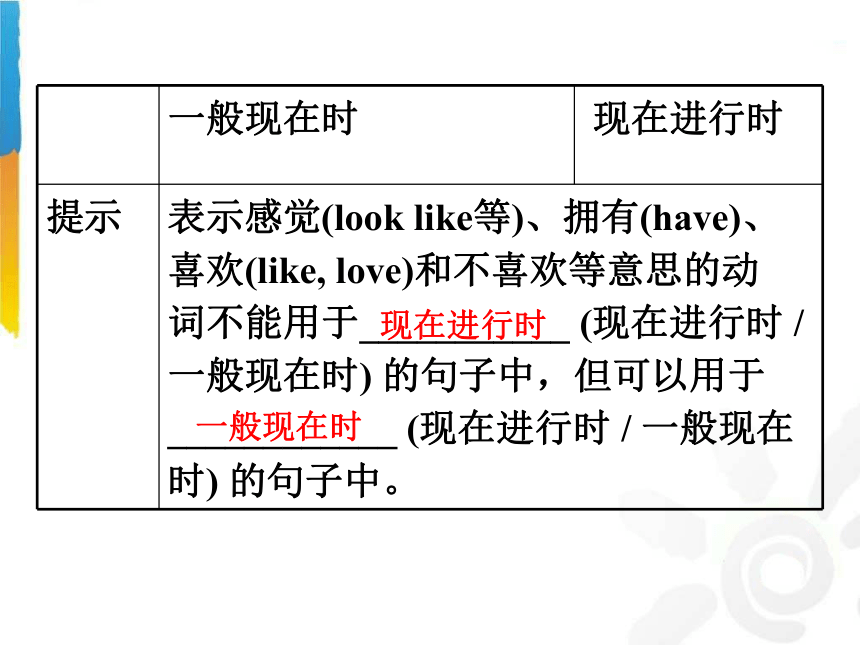
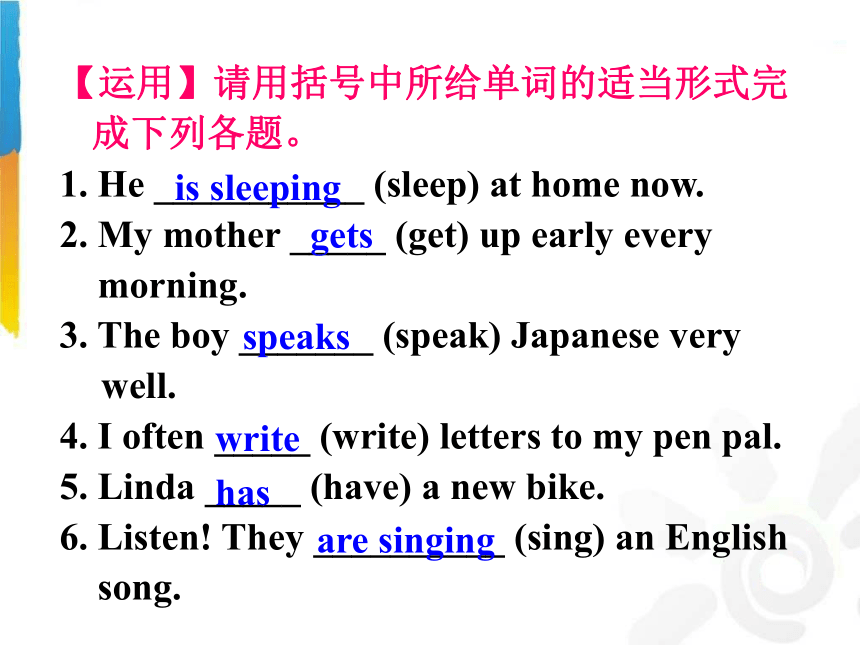
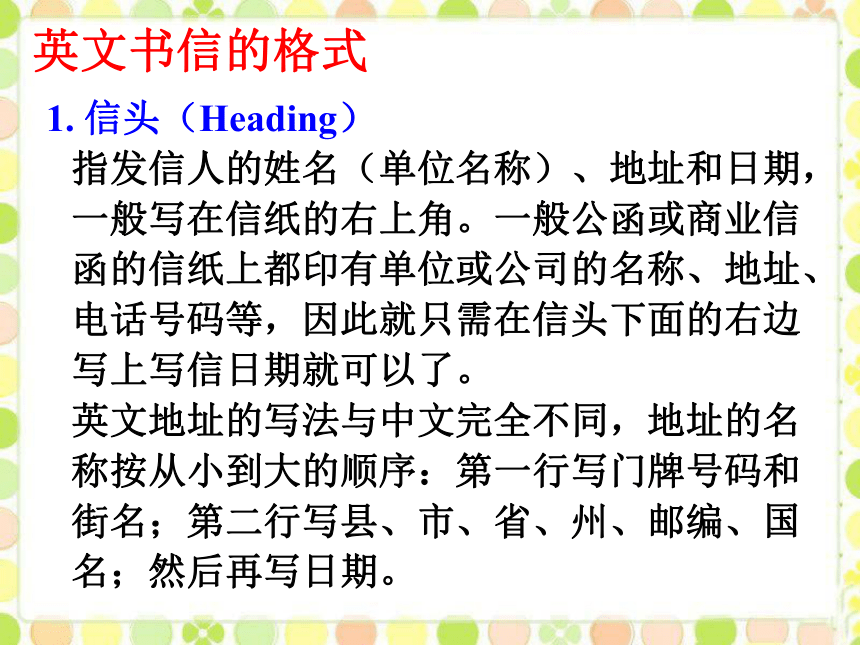
文档简介
(共23张PPT)
Unit5 Our School Life
Topic3 My school life is
very interesting.
Section D
February n. 二月
e.g. This office opened in February 1991.
这个办事处是1991年2月启用的。
hard adj. 坚固的;困难的;努力的
adv. 努力地;猛烈地
e.g. This ice cream is as hard as rock.
这冰激凌硬得像石头。
I tried so hard to please her.
我费很大劲去取悦她。
New words
一般现在时和现在进行时的区别
请观察下列例句,然后将结论部分补充
完整。
1. I often / always / usually / sometimes / never ask Miss Liu questions.
I am asking Miss Liu some questions now / at the moment / these days.
Grammar focus
2. He speaks English every day / on Sundays. Look! He is speaking English with Michael.
3. The sun is round.
4. Lily looks like her mother.
5. I don’t like computer science at all.
6. I have three pens.
7. I hope you have a good time.
一般现在时 现在进行时
意义 表示经常发生的动作或现阶段存在的状态用___________;表示说话人说话时正在发生或进行的动作用____________。 谓语 be动词(___________) 行为动词原形或第三 人称单数形式
时态标志 常与always, often, sometimes, seldom, never, every day, on Sundays 等连用 常与now, at the moment, these days等词, 或动词Look! Listen!等连用
一般现在时
现在进行时
am / is / are
be 动词 (am / is / are) + 动词-ing形式
一般现在时 现在进行时
提示 表示感觉(look like等)、拥有(have)、 喜欢(like, love)和不喜欢等意思的动 词不能用于___________ (现在进行时 / 一般现在时) 的句子中,但可以用于____________ (现在进行时 / 一般现在时) 的句子中。 现在进行时
一般现在时
【运用】请用括号中所给单词的适当形式完成下列各题。
1. He ___________ (sleep) at home now.
2. My mother _____ (get) up early every
morning.
3. The boy _______ (speak) Japanese very
well.
4. I often _____ (write) letters to my pen pal.
5. Linda _____ (have) a new bike.
6. Listen! They __________ (sing) an English
song.
is sleeping
gets
speaks
write
has
are singing
1. 信头(Heading)
指发信人的姓名(单位名称)、地址和日期,一般写在信纸的右上角。一般公函或商业信函的信纸上都印有单位或公司的名称、地址、电话号码等,因此就只需在信头下面的右边写上写信日期就可以了。
英文地址的写法与中文完全不同,地址的名称按从小到大的顺序:第一行写门牌号码和街名;第二行写县、市、省、州、邮编、国名;然后再写日期。
英文书信的格式
标点符号一般在每一行的末尾都不用,但在每一行的之间,该用的还要用,例如在写日期的时候。
日期的写法,如2011年1月30日,英文为:Jan 30,2011(最为普遍); Jan 30th,2011;30th Jan,2011等。
2. 称呼(Salutation)
是写信人对收信人的称呼用语。位置在信内地址下方一、二行的地方,从该行的顶格写起,在称呼后面一般用逗号(英国式),也可以用冒号(美国式)。
(1)写给亲人、亲戚和关系密切的朋友时,用Dear或My dear再加上表示亲属关系的称呼或直称其名(这里指名字,不是姓氏)。例如:My dear father,Dear Tom等。
(2)写给收信人的信,也可用头衔、职位、职称、学位等再加姓氏或姓氏和名字。例如:Dear Prof. Tim Scales, Dear Dr. John Smith。
3. 正文(Body of the Letter)
位置在下面称呼语隔一行,是信的核心部分。因此要求正文层次分明、简单易懂。和中文信不同的是,正文中一般不用Hello!(你好!)
4. 结束语(Complimentary Close)
在正文下面的一、二行处,从信纸的中间偏右处开始,第一个词开头要大写,句末用逗号。不同的对象,结束语的写法也不同。
(1)写给家人、亲戚,用Your loving grandfather,Lovingly yours,Lovingly等;
(2)写给熟人、朋友,用Yours sincerely,Yours,Love,Much love等;
(3)对上级、长辈用Yours obediently(Obediently yours),Yours respectfully(Respectfully yours)等。
5. 署名(Signature)
低于结束语一至二行,从信纸中间偏右的地方开始,在结束语的正下方,在签完名字的下面还要有用打字机打出的名字,以便识别。职务、职称可打在名字的下面。当然,写给亲朋好友的信,就不必再打了。
A Letter to A Schoolmate
June 23, 2013
Dear Xiao Wang,
I’m very glad to learn that you’re
going to visit me during the week-long
holiday. My parents will also be happy to
see you again. I am sure you will enjoy
every minute here.
范文
I have arranged our schedule for
the holiday as follows. On the first day
you arrive, I’ll show you around our
campus. On the second day, we’ll visit
the art gallery and the music hall. Next
day, we’ll climb a hill in the northeastern
part of the city. On the top of the hill, we
can have a wonderful bird’s eye view of
the city.
During the next three days, we’ll make
some short trips to some places of
interest nearby, such as the Swan Cave,
the Golden Lake, etc. On the last day, I’ll
see you off at the railway station.
Please remember to call and tell me
your train number and time of arrival so
that I can meet you at the railway station.
By the way, it’s very hot here and we have
a lot of sunshine, so don’t forget to wear
you sunglasses.
I’m looking forward to seeing you soon.
Sincerely yours,
Zhang Ying
I. 用括号中所给单词的适当形式完成下列各题。
How many math _______ (lesson) do you
have every week
2. Of all the ball games, I like football
_____ (well).
练习坊
lessons
best
3. Jim __________ (draw) pictures in the
room now.
4. Look! Jenny ___________ (clean) the
classroom. She _______ (clean) the
classroom once a week.
5. Thank you for ________ (teach) me so
well, Miss Liu.
is drawing
is cleaning
cleans
teaching
II. 请根据所给单词,组合成完整的句子(注意字母大小写)。
1. favorite, history, my, is, subject (.)
____________________________________
2. lot, from, program, a, can, the, I, learn (.)
____________________________________
3. hard, you, for, thank, work, your (.)
____________________________________
My favorite subject is history.
I can learn a lot from the program.
Thank you for your hard work.
A: What do you usually do on Sunday
B: I like r______ (1) our school
newspaper.
A: Oh, really I a___ (2) like it a lot.
B: I t______ (3) Great Music is wonderful. What do you like
reading
also
think
III. Fill in the blanks. (补全对话)
A: I like Science. It’s very i________ (4).
B: We can l_____ (5) a lot from our school newspaper. It’s really a great newspaper.
A: Yes, you are right.
interesting
learn
Unit5 Our School Life
Topic3 My school life is
very interesting.
Section D
February n. 二月
e.g. This office opened in February 1991.
这个办事处是1991年2月启用的。
hard adj. 坚固的;困难的;努力的
adv. 努力地;猛烈地
e.g. This ice cream is as hard as rock.
这冰激凌硬得像石头。
I tried so hard to please her.
我费很大劲去取悦她。
New words
一般现在时和现在进行时的区别
请观察下列例句,然后将结论部分补充
完整。
1. I often / always / usually / sometimes / never ask Miss Liu questions.
I am asking Miss Liu some questions now / at the moment / these days.
Grammar focus
2. He speaks English every day / on Sundays. Look! He is speaking English with Michael.
3. The sun is round.
4. Lily looks like her mother.
5. I don’t like computer science at all.
6. I have three pens.
7. I hope you have a good time.
一般现在时 现在进行时
意义 表示经常发生的动作或现阶段存在的状态用___________;表示说话人说话时正在发生或进行的动作用____________。 谓语 be动词(___________) 行为动词原形或第三 人称单数形式
时态标志 常与always, often, sometimes, seldom, never, every day, on Sundays 等连用 常与now, at the moment, these days等词, 或动词Look! Listen!等连用
一般现在时
现在进行时
am / is / are
be 动词 (am / is / are) + 动词-ing形式
一般现在时 现在进行时
提示 表示感觉(look like等)、拥有(have)、 喜欢(like, love)和不喜欢等意思的动 词不能用于___________ (现在进行时 / 一般现在时) 的句子中,但可以用于____________ (现在进行时 / 一般现在时) 的句子中。 现在进行时
一般现在时
【运用】请用括号中所给单词的适当形式完成下列各题。
1. He ___________ (sleep) at home now.
2. My mother _____ (get) up early every
morning.
3. The boy _______ (speak) Japanese very
well.
4. I often _____ (write) letters to my pen pal.
5. Linda _____ (have) a new bike.
6. Listen! They __________ (sing) an English
song.
is sleeping
gets
speaks
write
has
are singing
1. 信头(Heading)
指发信人的姓名(单位名称)、地址和日期,一般写在信纸的右上角。一般公函或商业信函的信纸上都印有单位或公司的名称、地址、电话号码等,因此就只需在信头下面的右边写上写信日期就可以了。
英文地址的写法与中文完全不同,地址的名称按从小到大的顺序:第一行写门牌号码和街名;第二行写县、市、省、州、邮编、国名;然后再写日期。
英文书信的格式
标点符号一般在每一行的末尾都不用,但在每一行的之间,该用的还要用,例如在写日期的时候。
日期的写法,如2011年1月30日,英文为:Jan 30,2011(最为普遍); Jan 30th,2011;30th Jan,2011等。
2. 称呼(Salutation)
是写信人对收信人的称呼用语。位置在信内地址下方一、二行的地方,从该行的顶格写起,在称呼后面一般用逗号(英国式),也可以用冒号(美国式)。
(1)写给亲人、亲戚和关系密切的朋友时,用Dear或My dear再加上表示亲属关系的称呼或直称其名(这里指名字,不是姓氏)。例如:My dear father,Dear Tom等。
(2)写给收信人的信,也可用头衔、职位、职称、学位等再加姓氏或姓氏和名字。例如:Dear Prof. Tim Scales, Dear Dr. John Smith。
3. 正文(Body of the Letter)
位置在下面称呼语隔一行,是信的核心部分。因此要求正文层次分明、简单易懂。和中文信不同的是,正文中一般不用Hello!(你好!)
4. 结束语(Complimentary Close)
在正文下面的一、二行处,从信纸的中间偏右处开始,第一个词开头要大写,句末用逗号。不同的对象,结束语的写法也不同。
(1)写给家人、亲戚,用Your loving grandfather,Lovingly yours,Lovingly等;
(2)写给熟人、朋友,用Yours sincerely,Yours,Love,Much love等;
(3)对上级、长辈用Yours obediently(Obediently yours),Yours respectfully(Respectfully yours)等。
5. 署名(Signature)
低于结束语一至二行,从信纸中间偏右的地方开始,在结束语的正下方,在签完名字的下面还要有用打字机打出的名字,以便识别。职务、职称可打在名字的下面。当然,写给亲朋好友的信,就不必再打了。
A Letter to A Schoolmate
June 23, 2013
Dear Xiao Wang,
I’m very glad to learn that you’re
going to visit me during the week-long
holiday. My parents will also be happy to
see you again. I am sure you will enjoy
every minute here.
范文
I have arranged our schedule for
the holiday as follows. On the first day
you arrive, I’ll show you around our
campus. On the second day, we’ll visit
the art gallery and the music hall. Next
day, we’ll climb a hill in the northeastern
part of the city. On the top of the hill, we
can have a wonderful bird’s eye view of
the city.
During the next three days, we’ll make
some short trips to some places of
interest nearby, such as the Swan Cave,
the Golden Lake, etc. On the last day, I’ll
see you off at the railway station.
Please remember to call and tell me
your train number and time of arrival so
that I can meet you at the railway station.
By the way, it’s very hot here and we have
a lot of sunshine, so don’t forget to wear
you sunglasses.
I’m looking forward to seeing you soon.
Sincerely yours,
Zhang Ying
I. 用括号中所给单词的适当形式完成下列各题。
How many math _______ (lesson) do you
have every week
2. Of all the ball games, I like football
_____ (well).
练习坊
lessons
best
3. Jim __________ (draw) pictures in the
room now.
4. Look! Jenny ___________ (clean) the
classroom. She _______ (clean) the
classroom once a week.
5. Thank you for ________ (teach) me so
well, Miss Liu.
is drawing
is cleaning
cleans
teaching
II. 请根据所给单词,组合成完整的句子(注意字母大小写)。
1. favorite, history, my, is, subject (.)
____________________________________
2. lot, from, program, a, can, the, I, learn (.)
____________________________________
3. hard, you, for, thank, work, your (.)
____________________________________
My favorite subject is history.
I can learn a lot from the program.
Thank you for your hard work.
A: What do you usually do on Sunday
B: I like r______ (1) our school
newspaper.
A: Oh, really I a___ (2) like it a lot.
B: I t______ (3) Great Music is wonderful. What do you like
reading
also
think
III. Fill in the blanks. (补全对话)
A: I like Science. It’s very i________ (4).
B: We can l_____ (5) a lot from our school newspaper. It’s really a great newspaper.
A: Yes, you are right.
interesting
learn
同课章节目录
- Unit 5 Our school life
- Topic 1 I usually come to school by subway.
- Topic 2 A few students are running around the play
- Topic 3 My school life is very interesting.
- Unit 6 Our local area
- Topic 1 Is there a computer in your study?
- Topic 2 My home is in an apartment building.
- Topic 3 Which is the way to the hospital?
- Review of Units 5-6
- Unit 7 The Birthday
- Topic 1 When is your birthday?
- Topic 2 Can you sing an English song?
- Topic 3 Everyone had a good time.
- Unit 8 The seasons and the Weathe
- Topic 1 What's the weather like in summer?
- Topic 2 The summer holidays are coming.
- Topic 3 Let’s celebrate!
- Review of Units 7-8
- 旧版资料
- Unit 5 Our School Life
- Unit 6 Our Local Area
- Unit 7 The Birthday
- Unit 8 The seasons and the Weathe
- Unit 7 Celebrating the Birthday(老版本)
